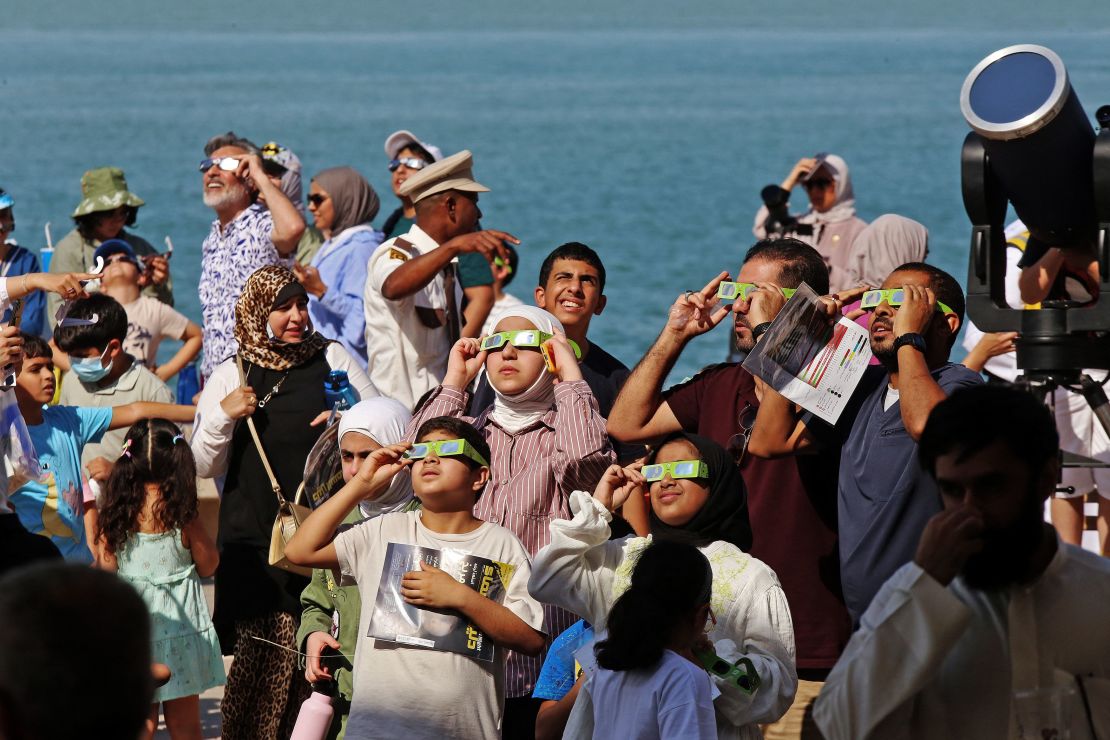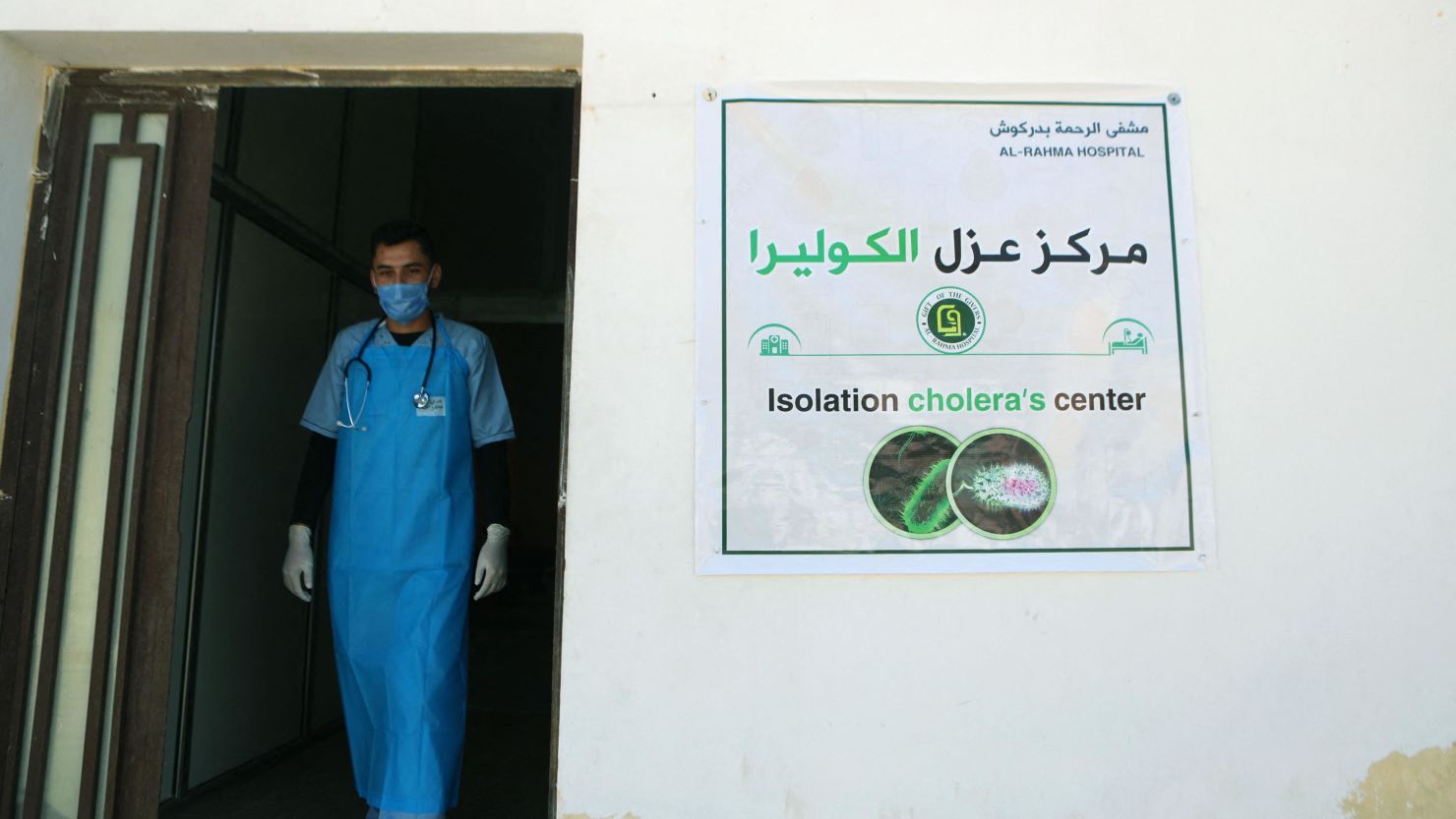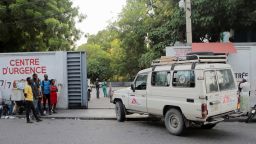Editor’s Note: A version of this story first appeared in CNN’s Meanwhile in the Middle East newsletter, a three-times-a-week look inside the region’s biggest stories. Sign up here.
Cholera is making a comeback in the Middle East and Africa, and its rapid rise has experts sounding alarms about the damage it is causing.
The disease had been in decline for years, but 2022 witnessed what the United Nations called “a worrying upsurge” around the globe. The World Health Organization (WHO) says that since January, 29 countries have reported outbreaks. For the previous five years, fewer than 20 countries on average reported outbreaks. The leading cause of the rise, says WHO, is water contamination.
The illness can be brutal, and is an indicator of poverty and social inequity, experts say.
Today, numbers are rapidly increasing as the disease spreads in parts of the Middle East and Africa.
That has led the International Coordinating Group (ICG), the WHO body that manages emergency supplies of vaccines, to “temporarily suspend the standard two-dose vaccination regimen in cholera outbreak response campaigns, using instead a single-dose approach,” WHO said last week.
The suspension of the two-dose approach allows for the vaccine to reach more parts of the world, it said. While the one-dose strategy has been proven to be effective, said WHO, protection appears to be lower in children.
Research has demonstrated that a one-dose vaccination can provide immunity for six months on average, Salim Oweis, communication officer at UNICEF’s Middle East and North Africa office, told CNN, adding that this “can be enough for stopping transmission during an epidemic.” The two-dose regimen, with a 15-day interval, offers protection for three to five years.
The rapid rise in cases has put a strain on WHO and its partners’ ability to respond quickly, said Dick Chamla, emergency preparedness manager for the Africa region at WHO. “The situation is made worse by the overlap between these epidemics and ongoing humanitarian crises and other catastrophes,” Chamla told CNN.
Marked by sudden and acute watery diarrhea, cholera can kill within hours if left untreated, warns WHO. It can, however, sometimes be treated with oral rehydration solutions in mild infections.
First documented in the 19th century, it went on to rise into six pandemics. Some parts of the world have been living through the seventh pandemic since the 1960s and 1970s, including countries in South Asia and Africa, says WHO.
UNICEF on Monday called for immediate action as cholera spreads through Syria and Lebanon, saying the disease is threatening the survival of children.
“Malnourished children are more vulnerable to developing severe cholera disease,” Bertrand Bainvel, UNICEF’s deputy regional director for the Middle East and North Africa, said in the statement.
“In the Middle East, more and more people suffer from food insecurity and malnutrition due to different factors linked to conflict, [economic] crisis, drought and water scarcity, making them more vulnerable in case of cholera epidemic,” said Oweis.
Lebanon, which hosts 1.5 million Syrian refugees, recorded its first case in three decades in October. It has since reported 718 cases and 11 deaths as of October 24, according to the Lebanese ministry of health.
“In refugees’ camps and informal settlements, the population is mostly composed of women and children living often in precarious situations with inadequate health, water and sanitation facilities,” said Oweis, adding that as of October 22, more than half of the suspected cholera cases were children under 15 years old “living in fragile settings.”
War-torn Syria has seen one of this year’s worst outbreaks. The disease has spread through the country’s northwest and northeast, and is linked to contaminated water near the Euphrates River, according to a report by Médecins Sans Frontières (MSF), or Doctors Without Borders. More than 13,000 suspected cases have been reported across the country, added MSF, including 60 deaths as of October 14.
UNICEF has made an urgent appeal for $40.5 million to expand its response in Syria and Lebanon alone.
Some African countries are also experiencing worsening outbreaks, including those who have already been struggling with the disease for years. Communities in Somalia, Cameroon, Malawi, the Democratic Republic of Congo and Benin have all reported a surge in cases, according to disease outbreak reports by WHO.
Ifedayo Adetifa, director general of the Nigeria Centre for Disease Control and Prevention (NCDC), whose country has been dealing with a rise in cholera cases amid the worst flooding in a decade, called for international help for nations struggling with the disease.
“Global health is supposed to be about solidarity,” Adetifa told CNN. “And by solidarity we don’t mean absolving governments of their responsibility, but it means that it is important that the countries that are less affected, and that have resources to spare, also come in and help,” he added.
International support, he said, can come in the form of vaccine programs and other investments in sanitation and hygiene.
Iran protests
Kurdish rights group Hengaw released a video showing what appear to be security forces in Saqqez, the hometown of Mahsa Amini in Iran’s Kurdistan region, late Tuesday, the night before the 40th-day marker of her death.
In Iranian culture, the 40th-day mark after someone’s passing is an important day of mourning. In the lead up to Wednesday, Hengaw said security forces had “been deployed in several areas in Saqqez.”
Meanwhile, Iran’s state-run news agency IRNA says that Amini’s family has made a statement to say they will not be marking her passing on Wednesday.
Here’s the latest on this developing story:
- All schools and universities in Iran’s Kurdistan region will be closed on Wednesday due to “increasing cases of the influenza virus,” IRNA reported.
- Tehran’s Sharif University of Technology announced that classes of new students will “continue to be held virtually until further notice” due to the “persistence of some problems and the lack of a calm environment,” IRNA said.
- Students at a university in the Shiite holy city of Qom disrupted a speech by the government spokesman on Tuesday, and could be heard chanting “women, life, freedom, man, country, prosperity.”
- On Monday, Iranian education authorities said students at a girls’ school in Tehran were injured after a dispute between students and officials over mobile phones in the classroom, state-aligned Tasnim news agency said.
- Norway-based rights group Iran HR said that at least 234 people, including 29 children, have been killed since protests started last month. CNN cannot independently verify the death toll.
The digest
Qatar ruler says nation faced unprecedented criticism as host country of World Cup
Qatar has faced unprecedented criticism since it was picked as the host of the 2022 World Cup, some of which has amounted to slander, the country’s Emir Sheikh Tamim bin Hamad al-Thani said on Tuesday. “We initially dealt with the matter in good faith, and even considered some of the criticism as positive and useful in helping us to develop aspects of ours that need to be developed,” he said.
- Background: Qatar, the first Muslim nation to host the tournament, has been the subject of criticism for its treatment of migrant workers and its anti-homosexuality laws. Players participating in the tournament have spoken out against the country. It expects 1.2 million visitors during the tournament, creating a huge logistical and policing challenge for the tiny country.
- Why it matters: The emir said that it appears that “the campaign is continuing and expanding and contains slander and double standards.” The emir said that the “fabrications and double standards” in the “ferocious” campaign against the country have prompted people to question the real motives behind the campaign. Doha has introduced reforms including rules to protect workers from heat and a monthly minimum wage of 1,000 riyals ($275), and says it continues to develop its labor system.
Israeli raid targeting Lion’s Den turns into deadliest day for Palestinians this year
At least six Palestinians were killed on Tuesday during an Israeli military operation targeting the Lion’s Den group and other militants. Five were killed in the old city of Nablus during an Israeli raid there, according to the Palestinian Ministry of Health. A sixth person was killed in Nabi Saleh by Israeli live fire, the ministry added, when Palestinian protestors took to the streets.
- Background: Israel said it was targeting Lion’s Den, a new militant group which emerged in Nablus this year and has targeted Israeli soldiers, killing at least two. Israel’s Prime Minister Yair Lapid said, “our goal was and remains to inflict severe and lasting damage on terrorism and its agents in Jenin and Nablus and anywhere else where terrorist nests grow.” He added that the head of the Lion’s Den and other militants were assassinated in the raid and that the “terrorist laboratory of Lion’s Den was severely damaged.”
- Why it matters: Tuesday was the deadliest day of violence in the occupied West Bank this year, CNN analysis of official Palestinian data showed. Palestinian Authority President Mahmoud Abbas condemned the killings as a “war crime” while calling on the United States to stop Israeli “aggression” in the West Bank before things “reach a very critical point,” according to his spokesman Nabil Abu Rudeineh.
Global energy transition might take 30 years, Saudi finance minister says
Saudi Arabia’s Finance Minister Mohammed al-Jadaan said on Wednesday that the world’s energy transition away from fossil fuels could take as long as 30 years, necessitating continued investment in conventional resources to ensure security of supply, Reuters reported.
- Background: Saudi Arabia, the world’s top oil exporter, and fellow OPEC producers have warned of underinvestment in hydrocarbons, especially while spare production capacity is thin and demand still relatively healthy despite strong economic headwinds.
- Why it matters: Some of the biggest energy-consuming nations have been trying to wean themselves off fossil fuels to reach targets of zero net carbon emissions. Jadaan said the thinking about energy and climate change has now become “more realistic” in that transition will actually take “not only a year, not 10 years, [but] possibly 30 years.”
What to watch
Saudi Arabia’s ambassador to the United States, Princess Reema bint Bandar Al Saud, rejected the accusation that the kingdom is cooperating with Russia, saying it engages with “everybody across the board, those we agree with and those we disagree with.”
In an interview with CNN’s Becky Anderson, Princess Princess Reema welcomed the Biden administration’s review of its relationship with Riyadh, because “the kingdom is not what it used to be five years ago.”
“Our relationship is more than the sale of arms and it is more than the exchange of oil,” she said.
Watch the interview here:

What’s trending
Egypt: #Death_Game
Egypt has warned against a dangerous social media challenge that has gone viral among children.
The challenge, known as the “death game,” involves a person taking several deep breaths then proceeding to hold their breath while another presses on their chest. The subsequent loss of consciousness is meant to temporarily replicate the feeling of death.
Social media challenges, or internet challenges, are viral videos where users film themselves doing a difficult task and distribute the video, daring others to repeat it. They are often done to raise awareness for charitable causes, but some have resorted to dangerous methods.
Egypt’s Ministry of Education said that a number of school children had exposed themselves to danger by playing the game to post on social media, Egyptian news sites reported. The ministry called on schools to monitor children’s behavior and prevent such practices in their facilities, while also asking parents to keep track of the content their children consume.
In one widely shared video that caused outrage in Egypt, a girl in a school uniform is seen holding her breath as another girl presses on her chest with both hands. The girl holding her breath eventually collapses.
“We live in a terrifying era,” tweeted a user, commenting on the video. “May God protect all our children.”
The phenomenon has captivated Egyptian television talk shows and social media, amid calls for parents and schools to raise awareness about the danger associated with the challenge.
Photo of the day




